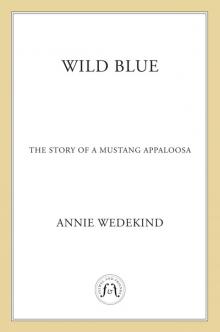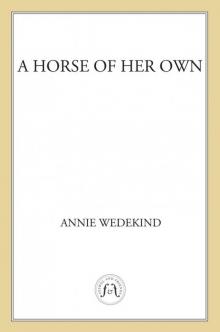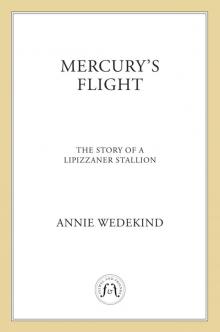- Home
- Annie Wedekind
Mercury's Flight - The Story of a Lipizzaner Stallion Page 3
Mercury's Flight - The Story of a Lipizzaner Stallion Read online
Page 3
I was too amazed by the people and cars to take much note of the particular sights he mentioned, but his steady patter was soothing. The wide roads, the strange statuary, the sweep and breadth of this man-made landscape were marvelous and slightly terrifying. The mingling of trees and orderly plants—not, as the groom noted, looking their best in very early spring—with the enormous white buildings fronted by gravel drives and fountains was such a combination of nature and craft to make a horse quite confused. Did we really belong here? In a place where, it seemed, we were the lone animals, except for small barking dogs straining at their leads to get a better look at us?
“The Schwarzenberggarten starts here … we’ll pass the palace soon … here’s the trolley ringing its bell for you—easy there, old boy. Nothing to worry about. Just another sort of train, on wires. We’ll cross over to a quieter street now. Ah, smell that? Coffee. I have a passion for it. Strudel, too. I have as big of a sweet tooth as you horses. I’ll bring you a bit of apple strudel and you can try it. We won’t tell the others.”
And so our procession continued, past palaces and royal gardens, museums and libraries, cafés and apartment buildings, all cheerfully described by the slim, long-legged boy beside me. He smelled of sugar and damp wool and horses, and his voice, though pitched higher than Jan’s, was pleasant. In front of me, Ned and Pluto Adrina seemed to be enjoying themselves, though Ned was impatient with our pace, kept necessarily slow by the uncertain footing of the wet streets and the uneven cobblestones we occasionally hazarded.
As I became calmer and more in control of all the strange sensations of the city, I started to notice more. The smell of coffee—I recognized it by the third café we passed—bracing, earthy, and comfortable. The size and shape of people and the number of ladies … far more than I had ever seen before. The ladies often went with the small dogs. The smell of damp fur from the ladies’ coats, the smell of smoke from the chimneys. The queer smell of the trolley—like lightning. And then I couldn’t help but notice the effect we seemed to have on the people we passed. At first, their sheer number had made them incomprehensible—they were no more than a noisy crowd. But twenty minutes into our procession, I could tell how much attention we attracted. Men and women peered at us from windows, waved to us from the trolleys, honked the horns of their cars (which made the grooms cross). Pedestrians made way for us, smiling broadly and sounding soft oohs and ahhs. Behind me was a herd of children keeping as close to us as they dared, and frequently being hushed and shooed by our grooms. After about the fourth scolding, the children in front quieted down and marched solemnly along, taking it upon themselves to hush and scold all of the new children who came skipping up to join the parade.
All this, apparently, was for us. Had they never seen a horse before?
“See, Schnecki?” said my groom. “You’re famous already. Everyone loves the horses of Die Spanische. You’ll have an audience every time you train and little faces waiting to get a peep at you when you go back to the Stallburg. You’ll have to get used to living in the limelight.”
Just then the sun came out from behind the clouds and lit the scene before me with a cheerful glow. It was impossible to resist: the brightening day, the happy faces around me, the excited whispers of the children, the respect and awe that we obviously excited. I picked up my feet and arched my neck, feeling strength and health flow through me from my head to my quarters. It didn’t matter that I was splashed up to my hocks with slush or that my tail was quite bedraggled. My groom’s hand was steady on my lead and we walked well together. I felt—proud. I found the city beautiful and its inhabitants friends already. I suddenly knew that I was, indeed, home.
And what a home it was. If there hadn’t been a distinct horsey smell coming from the graceful white walls of the lofty buildings on either side of me, I would have assumed they were just two more palaces like the others my groom had pointed out. But this, apparently, was our actual residence. The neighing beyond the walls confirmed it. I stared up at the swooping archways, felt all the strange man-made-ness of it all. Had they built a palace just for horses? Would the wonders of this day never cease?
We stopped for a moment, then turned into a kind of paddock, though like none I had ever seen before. It was lined with stone, and our hooves rang out as we stepped through the tall wooden doorway of the entrance into the courtyard. Creamy white walls arose on all four sides of this central expanse of stone, but they were less walls than another series of arches, as graceful and regular as the trees of Piber, and stamped out like horseshoes all in a row. The sky above this enclosure was a dome of soft blue. The noise and bustle of the city receded as the doors shut behind us; indeed, it was remarkably peaceful here, at least in contrast to the trolleys and small dogs.
It was far from still—there was plenty of activity to be seen and heard, but it was all horse-related activity, familiar and understandable. I caught a glimpse of a groom mucking out a stall, heard the rumble of a wheelbarrow, smelled oats and hay and other horses. I saw Dr. Besel, the stud’s manager, shaking hands with a man I recognized as Director Graf, and heard the clicking of cameras, which reminded me of the people who visited Piber and the fuss they made over us. Really, we’ve always been fussed over, I thought to myself, trying to observe the Director more closely. Perhaps here I’ll find out why.
Ned, of course, required no explanation. He looked absolutely delighted with our reception and was busy pawing the stones (to no effect), announcing his presence with authority. Pluto Adrina looked around for fillies and, finding none, hunted in his groom’s pocket for more sugar. I tried to sidle over to Ned, but my groom prevented the movement, kindly but firmly. The men talked for a little longer, we were patted in both welcome and good-bye, and then we were led through one of the innumerable archways to discover where in a palace a horse might sleep.
CHAPTER 4
“I hope you’re not noisy. My last neighbor slobbered his oats so dreadfully it quite put me off my feed. Try to practice a modicum of restraint during meals, young stallion. There is nothing worse than attempting to enjoy a quiet meal while being assaulted by the sounds of a horse doing his best imitation of a pig.”
My neighbor stared balefully at me for a moment. I stared back, unsure what, if anything, I should say. Perhaps I could simply refrain from slobbering and that would give him confidence. He was an absolutely noble old stallion, nearly a full hand shorter than I, but with an air and authority that made him seem much taller. His snowy neck was as finely curved as any of my new home’s characteristic arches, and his thick white mane hung in soft waves down his neck. His eyes were a glistening, intelligent black, his ears tiny and pointed, and even his large pink nostrils seemed dainty. He was also the cleanest horse I had ever seen in my life. He was, in short, the kind of horse who should be eating his oats from a red marble basin, with which all of our stalls were equipped.
The marble basin was only one of the wonders of the Stallburg. All of the fittings of my roomy box stall were different from the ones in the barns at Piber—more worn, perhaps, but comfortable, with the straw fetlock-deep, a salt lick nestled in the corner, the bars on two sides nicely spaced for a muzzle touch. The front of the stall, above the dark wood paneling, opened onto a narrow, crooked corridor that wove between the rows of white and dappled gray (and occasionally brown) horse heads. More astonishing was the fact that I had a window carved into the wall above me, and by the window a sort of frozen, white horse head grew out of the wall, which curved, of course, into the arch that formed the ceiling of this horse palace. The whole building was snug on a horsey scale and yet grand in a human way, and that seemed appropriate from what I had seen so far of how life in Vienna was styled for a Lipizzaner.
Hearing no response, my neighbor turned his hindquarters to me in a pointed fashion. Through the opposite bars I could hear Ned, thankfully my other neighbor, making a loud acquaintance with the horse on his other side:
“Great hall, this one! We call it the Royal We
e, ’cause, y’know, they pick up our straw as soon as we have a pee. The stallions in the other two halls say they get the same treatment, but I’ve seen some dirty coronets, swear on my dam’s forelock. Anyway, what’s your name?”
“Ned, what’s yours?”
“Heck, you’re not Ned anymore. That’s a farm nickname. What’s your full name? Mine’s Conversano Bonadea, and my rider calls me ‘Bonadea,’ and my groom calls me ‘Bonny.’ That’s how nicknames go around here—by your mother’s name. I mean, back at Piber they called me Witzbold,1 but obviously I’ve outgrown that.”
“Oh, well, I’m Neapolitano Galanta.…”
“So you’ll be ‘Galanta’ or maybe just ‘Galant.’ See?”
Ned apparently did see, and saw no reason to further question his abrupt change of name, for the conversation moved to the topic of our hay and its superior quality to the hay served in other halls. But I was flummoxed. Ned was no longer Ned? And was I no longer Schnecki? Was I also Galanta, or Galant? I wouldn’t mind sharing a name with Ned, though I imagined it might lead to some confusion. But then—no. Galanta might for all intents and purposes be my dam, but I did not share her name with her natural son. Of course, I bore my birth mother’s name. I was Favory Mercurio. They would be calling me Mercurio.
I was horrified. To lose my nickname—familiar and dear as it was—was bad enough. But I could bear trading it for something else—perhaps simply Ned’s brother. Instead I would be shackled with the constant reminder of the shame of my past, of my dam’s rejection. It was a mockery to be called by the very name of the horse that despised me, that would probably be outraged if she knew. How could I make a new beginning under this cloud, this humiliation? And once the other horses found out I had been spurned at birth and discovered the irony of my nickname, they would torment me, I was sure. There was a cocky air to Ned’s neighbor, Bonny, and a sense of competition in the air. We were, after all, thirty-five or so stallions all lodged one on top of the other in three lengths of corridor crooked as a rabbit’s warren. Life would be miserable if they ganged up on me. For where would I go? There were no hills … no mountains … no escape.
“You look unhappy.”
I jumped. My other neighbor had swung his hindquarters back around and was now sniffing at me through the bars. His expression was stern, as if he were personally offended by my lack of spirits.
“It’s just a bit crowded,” I muttered.
The old stallion snorted dismissively. “Oh yes, that’s what all the first years say. I want to run, I want to play. It is time to put childish things away, young stallion. You are here to learn. To work. To become great.”
I let the obvious question—become great at what?—lie for the moment. I wondered if the old stallion, who had years of experience under the arches of Die Spanische, could shed any light on my dreaded new name.
“I was just overhearing that our riders call us … some sort of nickname?” I snuffed around in my hay, keeping my face averted.
“I wouldn’t call it a ‘nickname’ per se.” He snorted again. He had a most emphatic snort, and I was soon to discover that it was the backbone on which most of his conversation hung. “A ‘convenient abridgement’ would be more appropriate. There are only six classical stallion lines and, of course, quite a number more mare lines and mare names available, so for the sake of contraction the stallion’s second name is preferred, otherwise we’d have seven Plutos trotting about and ten Maestosos, etc. It’s only a matter of common sense.”
“And it’s not strange that suddenly we are called … mares’ names? Our mothers’?” My nervousness must have been apparent, for the old stallion replied most pointedly.
“Not if you’re quite secure with your masculinity.”
I don’t know what’s worse—being called “Mercurio” or having my stallionhood challenged by a short old bully in the next stall, I thought.
I lifted my head high at his challenge and looked down at him with what I hoped was an expression of supreme unconcern. I arched my tail a bit and settled my hindquarters squarely. Schnecki I might be, but I had my pride.
“My name is Favory Mercurio,” I said.
“And I am Siglavy Strana. Pleased to make your acquaintance, young stallion.” The old horse’s eyes twinkled up at me, obviously delighted that he had provoked me so successfully.
“So you are called ‘Strana’?” I asked.
The blast of a snort I received told me I’d stepped in it again.
“They call me Maestro. You’re quite welcome for cheering you up.” With that, Siglavy Strana—the Maestro—turned his hindquarters back in my face and fell asleep.
* * *
There was little sleep for me that night. The chattering neighs and whistles of a dozen stallions rang up and down the corridors intermittently—everyone seemed excited by our arrival and most felt the need to announce their own position in the school, which was truly one large herd. Our hall—the Royal Wee—was a mixture of mature school stallions (who were uniformly quiet and slept soundly) and younger stallions in either their first or second stages of training (they were the noisy, self-announcing group). And there was something different about sleeping in a city, without the usual nighttime chorus of crickets and wind in the trees. The city sounds were not obtrusive, but still there was a distinct feeling that outside these walls was not Nature but Man. So despite the comfort of my stall and the excellence of my supper, I was restless, nervous, and more than a little claustrophobic. Even when the last snorts and grumbles and jeers died down and a heavy quiet settled over the Stallburg, I stood alert, eyes wide to the half-dimness around me. That was another difference: The barn was never fully dark, not the deep dark of winter nights in the mountains.
By morning I was tired, stiff from standing in one position for so long, and feeling very homesick. I greeted Ned through the bars of our adjoining stalls and could smell the excitement coursing through him.
“Some place!” He pawed his straw enthusiastically. “Wonder when we get breakfast? Wonder what we do today? Wonder who our groom will be?”
“Not groom—élève,”2 Bonny interrupted. “You’ll get assigned an élève. All the first years do. I’m a third year—just got advanced to the campagne, or lower school, and my élève got promoted to assistant rider already. Couple more years in the campagne and then High School. Can’t wait for High School. My sire was a champion capriole performer and everyone expects big things from me, I can tell you.” Bonny broke off to chug some water from his basin, giving Ned the opportunity to say what I was wholeheartedly thinking:
“What in the name of Pegasus are you talking about?”
Bonny chuckled into his basin, bubbling water over the sides. “No worries,” he said with a snort (not as elegantly as the Maestro). “You’ll pick up the lingo soon enough. Besides, all you have to do for the next week is run around and sleep and eat. Hey, here they come!”
I pricked my ears at the sound of men’s voices approaching. I was pleased to see my guide of yesterday, and very glad that it was his hand at the door of my stall, rumpling my forelock and saying in a kind voice, “Good morning, old fellow. I bet you’d like to move around a bit, wouldn’t you?” I very much did, and I snuffled his sleeve and fingers with as much enthusiasm as I could muster, given the state of my taut nerves.
“You are fortunate,” Maestro commented through the bars. “Young Max is a fine boy. Take in his scent and tell me what you find.”
I took a few deep breathes, tasting the air, Young Max’s hands, and then rubbed my muzzle on his chest. I didn’t know what Maestro expected me to discover; all I could smell was the boy’s flavor of wool and sugar, snow and apples, and a kind of warm, woodsy scent that reminded me of home, though I couldn’t quite place it with anything from Piber. Then Max dug into his pocket and pulled out a small, indeterminate lump, which he offered to me. It smelled like the cafés we had passed the day before—sweet and spicy. It melted on my tongue almost the instant it was in
my mouth, leaving behind an exquisite taste of apples and autumn.
“Strudel.” Max winked at me. “I told you you’d like it!”
“Max, if you are giving that baby strudel already, you’ll spoil him before his first week is up,” came a teasing voice from down the hall.
“And how is it different from all the sugar, eh?”
“Because next he’ll want a cup of coffee and a newspaper,” the unseen élève retorted, and the sound of quiet laughter skipped up and down the corridor. It was a pleasant sound. Between the lingering bits of cinnamon and apple on my tongue, the cheerful voices of the young men, and Max’s homey smell, I was feeling considerably better.
“I don’t know what he’s supposed to smell like,” I remarked to Maestro, “but I like the strudel very much.”
“Oh, well.” The old horse sighed. “I thought you might find him familiar. We are all linked by the blood of empire, in various ways. Your founding sire, Favory, was born in the Imperial Stud of Kladruby, in Bohemia.3 Hundreds of years ago of course. But Young Max is from the same part of the world, on his dam’s side. By the great river Elbe. As is Oberbereiter Polak, the greatest man here.”
There was no time to make further inquiries into the odd notion that my élève, the greatest man at Die Spanische, and I all somehow came from one stud farm in a place I’d never heard of, for Max was leading me out of my stall, in the wake of Ned and a handful of other horses.
“Have fun!” Bonny called. “If you see Slava, give him a kick in the hindquarters for me. I hate that guy.”
“Sure!” Ned trumpeted back, ready, as always, for anything, even if it involved picking a fight with a total stranger. “But where are we going?”
“To the Winterreitschule, freshie! Fanciest paddock you’ll ever see! Just don’t poop where the emperor can see you!”

 Wild Blue - The Story of a Mustang Appaloosa
Wild Blue - The Story of a Mustang Appaloosa Little Prince - The Story of a Shetland Pony
Little Prince - The Story of a Shetland Pony Samirah's Ride
Samirah's Ride A Horse of Her Own
A Horse of Her Own Mercury's Flight - The Story of a Lipizzaner Stallion
Mercury's Flight - The Story of a Lipizzaner Stallion